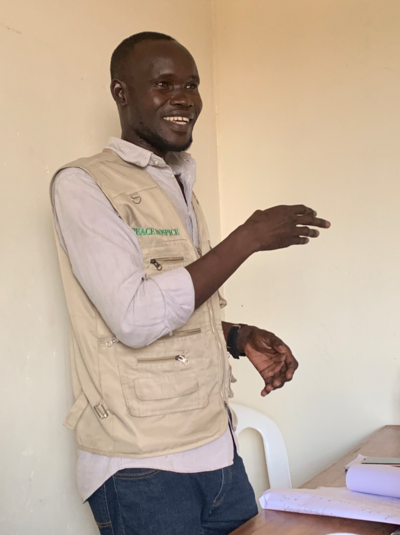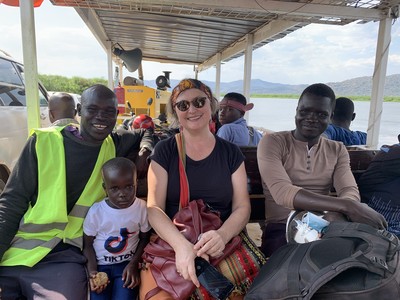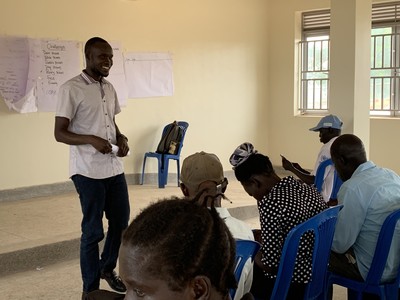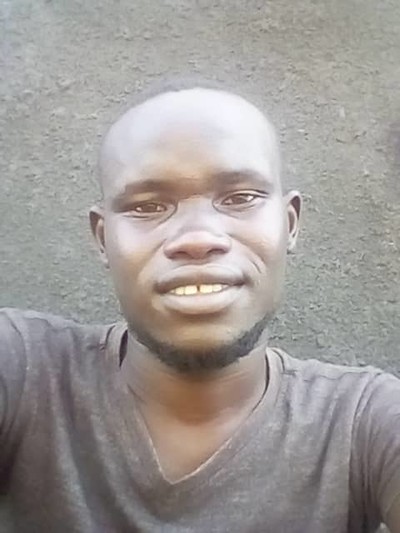
Blog: An interview with Godfrey Oziti, Cairdeas Scholar
![]() Hannah Ikong
Hannah Ikong
![]() 30th May 2023
30th May 2023
Godfrey Oziti may be a name you’ve heard of before in Cairdeas IPCT. Godfrey serves as a nurse with our partner Peace Hospice in Adjumani and Obongi districts (Northern Uganda), is involved in many training and research activities, and now is a Cairdeas Scholar as he continues his education in nursing.
You may have also met Godfrey in our March 2020 blog on palliative care services during COVID-19 in Northern Uganda. Rereading this blog and speaking to Godfrey more over this last month has brought me to a realisation: Godfrey has a huge heart for his patients.
In our last conversation, I asked him to define “palliative care.” I am always curious of how those have worked or specialised in a field for some time put “palliative care” in their own words. Godfrey didn’t tell me a textbook definition either; rather, he captured the heart of palliative medicine by telling me a story.
“Let me start with a scenario. Okay, once I paid a visit to a certain patient in the community and the patient had a fungating wound that was smelling really bad. The family was locking the patient inside a room because they said that he was smelling badly. At first the family first refused me to come in there. But I insisted and then I went inside with the patient. I asked them to bring soap and water, and then I bathed him and arranged the room. After that, I told them to bring them food and we started with tea, and we kept on eating. And he [the patient] was very happy to be staying in a clean environment and eating.”
Godfrey went on to explain the symptom management of the wound, how they could help with the patient’s pain, and what he did to work with the family to understand the patient’s condition and how to care for the patient well.
After talking about this particular patient, he begin to tell me that there is indeed a need for community sensitisation and education on palliative care needs. “We do love our families” he explained, “but sometimes with they are sick, we leave them alone. And so the psychological diseases take many of our patients. And there is really a need for us and with my studies, I know we should do more.”
His studies! I had to ask about the scholarship that he received and how school was going. He started his Diploma in nursing this year and will be going for the first end of semester exams soon. The programme is a year and a half, located in the Gulu School of Nursing and Midwifery.
Asking about his schooling quickly turned to plans of the future. “I know that from here, I can do any other course or diploma,” Godfrey explained after saying that it was his dream to go back to school. “Our medical nursing tutor is very encouraging and gives us career guidance so I am really learning so much from her. She elaborates on what to do and how to go to the next step in their career. She adds this advice to her lectures.”
He’s looking forward to the next semester already as one of the courses is an introduction to medical research, including its theories and principles. Godfrey was quick to tell me that he really has enjoyed his time in data collection in the several research projects involving Cairdeas IPCT and Peace Hospice.
He was also quick to explain why: “I love talking to the participants and getting their views, how they are really coping up with their challenges and how we are addressing them. That’s what I really enjoy, getting to know someone’s problem and then and then offering psychosocial support afterwards too.”
I wanted to dig a little deeper; to better understand Godfrey’s heart for patients and how he has learned this approach. When I asked about professional mentors in nursing or palliative, the name “Vicky Opia” appeared, the Peace Hospice Executive Director and Palliative Care Ministry of Health lead for Adjumani district. This is what he told me:
“Sister Vicky has mentored me mostly in palliative care because in my [nursing] certificate, there was only a small part of the course in palliative care. When I join Peace Hospice, the first thing I noticed was how she handled patients with chronic illnesses and the way she did her work; how she was giving care to the patients was inspiring. So I started to copy what she was doing and how she was relating with the patients. I thought to myself, I need to start working with chronic illnesses. I need to work like Sister Vicky. Even if I do not go back to school, I need to work like Sister Vicky. That is how I started to love my work so much.”
Godfrey then explained how at the beginning, he met a patient in critical condition who had given up on life. “The nursing care that was modelled for me by Sister Vicky was a kind of care that gives the patient’s life back and is enjoying life again. I like to transform the patient’s life, so they are not just counting down the days.”
As a Cairdeas Scholar and nurse at Peace Hospice, Godfrey is looking forward to doing more palliative care work in his future. He hopes to keep on studying (or learning) and is most concerned working with refugees and other vulnerable populations.
Godfrey is concerned that there is not enough of the right type of health care worker to provide for palliative care. “You know,” he told me in closing, “the people available with the knowledge of palliative care and with the time to talk to the patient and family members are not there. But if I can go through my studies and go through to be a specialist, then I can do more as Peace Hospice is concerned.”
His heart for the patient – compassionate, quality palliative care service provision at its best – as well as his concern for patients without such services is a call to action at Cairdeas. We must continue the capacity building, training, advocacy and research to support palliative care services with health care systems as well as for communities and individuals.
As an individual, Godfrey’s last comment was one of gratitude, thanking Cairdeas for the partnership and support of Peace Hospice. “I am so happy for Cairdeas for carrying out the different training for village health teams (VHTs) and health care workers and providing scholarships for people like me. I hope they continue to expand the scholarship programme.”

Godfrey Oziti in the Peace Hospice uniform, giving feedback during a recent training.

Godfrey Oziti (left) sits on the ferry crossing the Nile River next to Dr Mhoira Leng and Simon Maku.

Godfrey Oziti leads a discussion on community generated research data with village health teams in Obongi district.

A snap from Godfrey himself.
